Hasan Hosein was playing a competitive game of cricket when he began to feel unwell. But the 17-year-old from Trinidad, one of the most southern islands of the Caribbean, dismissed his weakness and headache, attributing his symptoms to the effects of traditional fasting for Ramadan.
"During this month, I typically feel weak during the day when I don't eat or drink," explains Hasan, "So I was feeling pretty normal for Ramadan."
When he collapsed on the field, Hasan's family first assumed he was dehydrated. But doctors soon diagnosed a serious kidney disorder, one that couldn't be treated with drugs. Hasan was in end-stage renal failure.
"In a very short time, we went from watching a healthy teenager playing cricket to the idea of losing him," says Noor Hosein, Hasan's father.
A kidney transplant could save Hasan's life, the family learned. Research led them to Mayo Clinic in Rochester, Minn., nearly 3,000 miles away.
"We purchased one-way tickets," says Noor. "We had no idea what would happen or how long we would need to be at Mayo Clinic. We were going to stay as long as necessary."
Father and son met with doctors to discuss treatment options, including transplant, and Noor asked to be tested as a possible kidney donor. He was a match.
"Everyone tells me that donating my kidney was such a remarkable gesture, but it felt natural to me," says Noor. "What Mayo Clinic did was remarkable — taking my kidney and making it work for my son."
After a successful transplant and recovery in Rochester, father and son returned to Trinidad, where Hasan resumed an active lifestyle.
"We are grateful to have a normal life back for our family and especially for Hasan," says Noor. "He has a future ahead of him thanks to God and Mayo Clinic."








